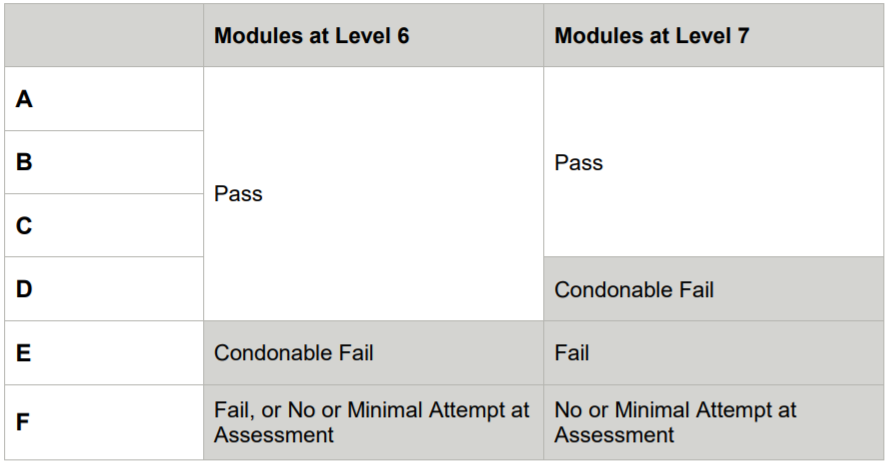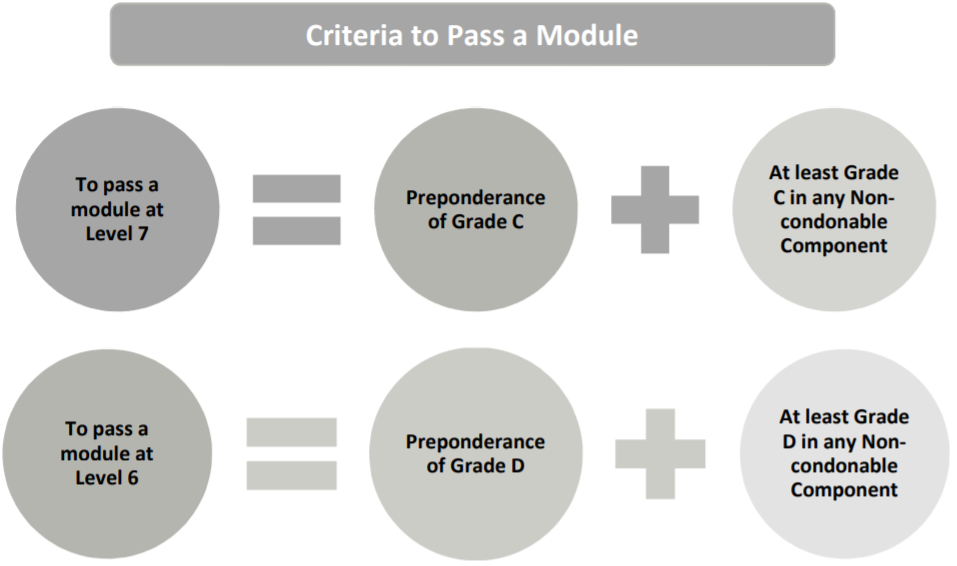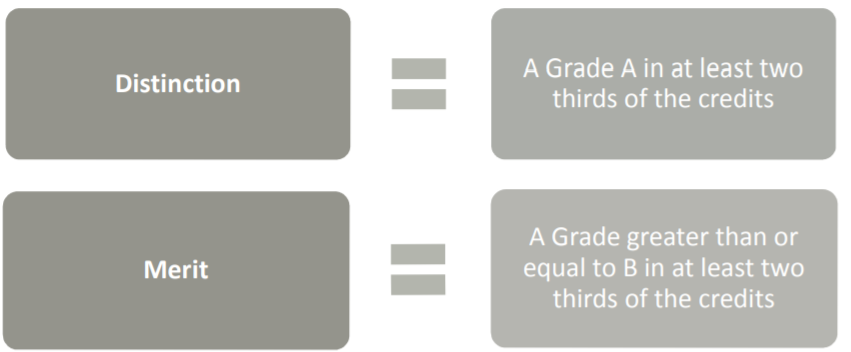For assessibility purposes, the following page is also available as a PDF via:
2018-19 marks the final year of integrating the IOE with the main UCL regulations. There are a number of changes to be aware of for Taught Postgraduate and Graduate programmes, including new Condonement regulations and revised Taught Masters Classification Criteria.
The changes apply to all new and continuing students as soon as they enrol or re-enrol on the 2018- 19 academic session. This is a summary of the main changes - please also take some time to read and digest the regulations themselves.
Letter Grade Marking Scale
The new regulations include a Letter Grade Marking Scale for IOE Graduate and Taught Postgraduate programmes, including the MRes. The main changes include dividing the fail range into discrete categories including a Condonable Range, and the alignment of the Graduate Diploma and Graduate Certificate Pass Mark with the rest of UCL.

A letter grade version of each regulation is included throughout the Academic Manual Chapter 4: Assessment Framework for Taught Programmes.
Some programmes include a small number of modules at a different level (e.g. a Masters might include one 30-credit level 6 module). The marking scale should correspond to the level of the module rather than the student’s programme.
The IOE is responsible for ensuring that appropriate arrangements are put in place for any students who take modules in another UCL Faculty which operates a numeric marking scale, and vice versa. A conversion scheme should be agreed in advance of the module, and made available to students.
More information: Chapter 4, Section 3: Module Assessment
Criteria to Pass a Module
The way in which module grades are calculated has been standardised across UCL. The changes apply to all new and continuing students who are fully enrolled on the 2018-19 academic session.
The ‘Preponderance Method’ is used on programmes operating a letter grade scale. This means that the module grade is determined by the letter grade in which the majority of component grades falls. For example:

Additionally, if a component is essential to professional accreditation or essential to achieving a degree in a particular field of study, it may be designated as ‘Non-Condonable’ for a particular programme. It is only possible to have a Non-Condonable Component within a Non-Condonable Module.

Students must pass all Non-Condonable Components. If a student fails a Non-Condonable Component, they will be reassessed in the module.
More information: Chapter 4, Section 3: Module Assessment
Module Condonement
From 2018-19, the IOE will align with the rest of UCL in allowing a student to be awarded a degree if they are carrying a small amount of failure, as long as their overall performance is good.
Students should pass all credits. If not, the Condonement Criteria will be applied:
Postgraduate Condonement Criteria (inc. MRes)

Graduate Condonement Criteria

More information: Chapter 4, Section 9: Progression and Award
Applying Condonement
The way in which Condonement is applied has been standardised across UCL. This includes the following principles:
- If a student meets all of the Condonement Criteria, they will be condoned and will not be reassessed.
- If a student does not meet all of the Condonement Criteria, including failing more than the maximum number of Condonable Credits, they will be reassessed in all of the failed modules, including those in the Condonable Range.
- On Flexible and Part Time programmes, Condonement can only be determined at the end of the taught modules. Until then students will be reassessed in all failed modules including those in the Condonable Range.
- If a student submits a valid claim for Extenuating Circumstances they will normally be offered a Deferral before Condonement is considered.
- Modules are normally ‘Condonable’. If a module is essential to professional accreditation or essential to achieving a degree in a particular field of study, it may be designated as ‘NonCondonable’ for a particular programme.
- All Optional and Elective Modules are Condonable unless they are essential to professional accreditation.
- All Masters Dissertations/ Substantive Projects are Non-Condonable.
- Condonement is determined by the student’s parent Programme, not on a module-bymodule basis.
- Condonement does not apply on programmes which are assessed on a Pass/ Fail basis. This includes Initial Teacher Education programmes and some clinical programmes – this will be explained in the individual Programme Summary.
- The regulations apply to all new and continuing students who are fully enrolled on the 2018- 19 academic session.
- These changes are in addition to those introduced in 2017-18: If a student meets the Condonement Criteria, they will be condoned and will not be reassessed. However students are eligible for a Merit or Distinction Classification if they have a condoned mark in their profile.
More information: Chapter 4, Section 9: Progression and Award
Size of the Masters Dissertation/ Substantive Project
In response to the needs of some professional disciplines including those at the IOE, Taught Masters programmes will now need to include an in-depth research or scholarly activity of at least 30 credits in the form of a Dissertation or other Substantive Project.
The regulations for Research Masters (MRes) programmes are unchanged - programmes should include a Dissertation/ Substantive Project of 105-150 credits (pro-rata for extended programmes). Some programmes have been granted approval by the Chair of the Research Degrees Committee to operate with a smaller Dissertation/ Substantive Project, or with a combination of modules counting as the Dissertation/ Substantive Project, and these arrangements will continue.
Taught Masters Classification
In response to feedback from UCL students and staff, and to a high number of requests for Suspensions of Regulations, the Taught Masters classification will now be determined from the preponderance only; there is no longer a separate Dissertation/ Substantive Project criterion.
A Distinction will now be calculated as follows:

The changes apply to all new and continuing Taught Masters students who are fully enrolled on the 2018-19 academic session, with the following exception:
- For Repeating Masters students, the Classification will be based on both the weighted mean and the mark in the Dissertation/ Substantive Project, in line with the 2017-18 regulations. In all other respects, students who are undertaking a Repeat will be fully enrolled on the 2018-19 academic session and therefore subject to the 2018-19 regulations.
The MRes will continue to include a separate Dissertation/ Substantive Project criterion.
More information: Chapter 4, Section 10: Classification
When do the regulations apply?
For the majority of Graduate and Taught Postgraduate students, the new regulations apply as soon as the 2018-19 academic session begins.
There are a few students who will still be subject to the 2017-18 regulations:
Repeating Students
Students who are Repeating modules from the 2017-18 academic session will be ‘fully enrolled’ on the 2018-19 academic session and therefore subject to the 2018-19 regulations with the following exception:
- The Classification will be based on both the weighted mean and the result in the Dissertation/ Substantive Project, in line with the 2017-18 regulations.
Deferring Students
Students who are Deferring with Tuition will be ‘fully enrolled’ on the 2018-19 academic session and therefore subject to the 2018-19 regulations.
Students Returning from Interruption
Students who are returning from an Interruption and enrolling on the 2018-19 academic session should be subject to the 2018-19 regulations. However if the student completed all of the teaching before the Interruption and is only returning to be assessed, the 2017-18 regulations will apply.
 Close
Close

